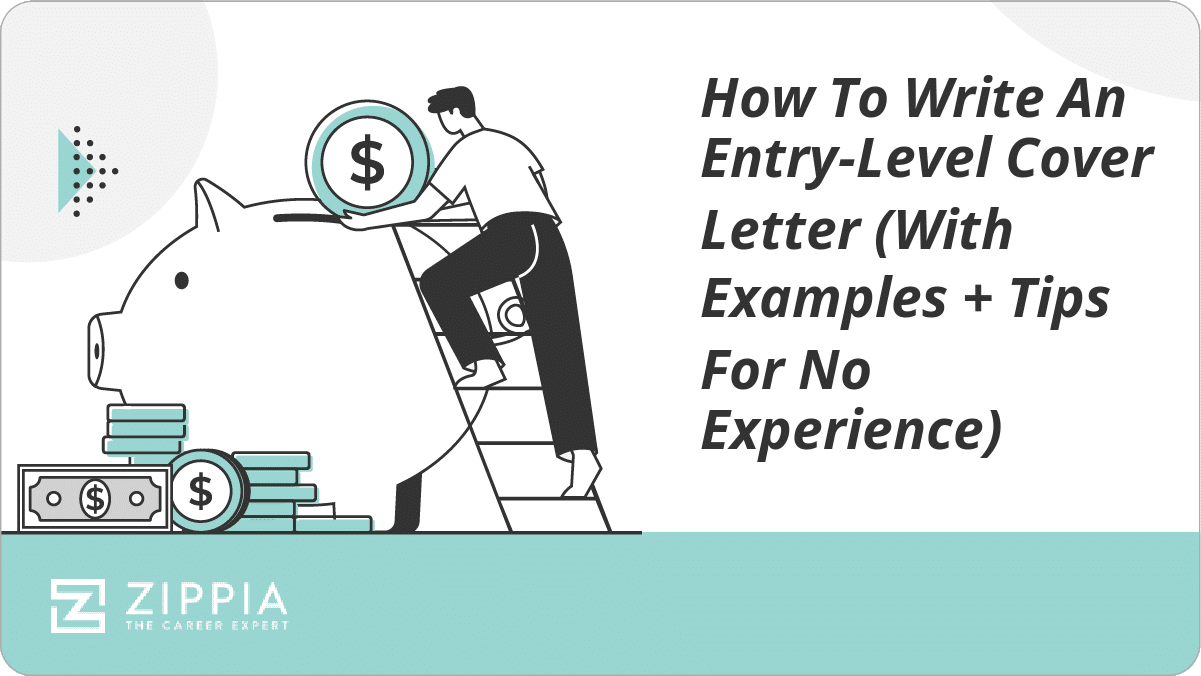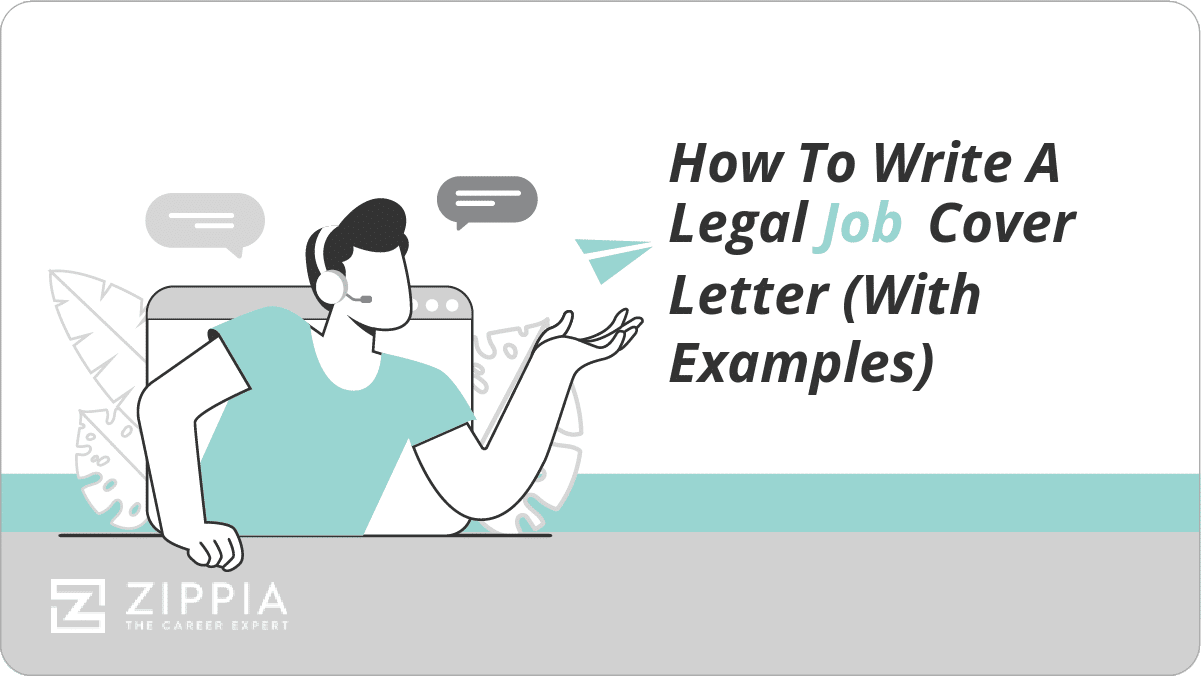- Cover Letter Basics
- Cover Letter Examples
- Cover Letter Examples
- Best Cover Letters
- Cover Letter For Internship
- General Cover Letter Templates
- Career Change Cover Letter
- Promotion Cover Letter
- College Student Cover Letter
- Entry Level Cover Letter
- Legal Cover Letter
- Creative Cover Letter
- Cover Letter For Government Job
- Cover Letter With No Experience
- Short Cover Letter Examples
- How To Send An Email Cover Letter
- How To Write A Cover Letter For A Job With No Experience In That Field
- Cover Letter Format
- Special Sections
Find a Job You Really Want In
- What Is an Entry-Level Cover Letter?
- How to Structure an Entry-Level Cover Letter
- Elements of an Entry-level Cover Letter
- Common Mistakes in Entry-Level Cover Letters
- Entry-Level Cover Letter Tips
- Examples of Entry-Level Cover Letters
- Entry-Level Cover Letter FAQ
- Final Thoughts
- Sign Up For More Advice and Jobs
If you’re an entry-level jobseeker, your cover letter is your best friend.
Your cover letter is an opportunity to stand out as an entry-level candidate – because sadly, your resume probably won’t. Most people applying for the position will have fairly similar resumes, trying to make the best out of their limited experience.
And like their similarly limited work experience and resumes, many of those other entry-level candidates make a lot of the same mistakes in their cover letters.
But a cover letter that’s tailored to the specific position you’re looking for will open doors for you – even when your resume alone won’t.
Key Takeaways:
-
Entry-level cover letters should be between 250 and 300 words. Do not go over 400 words.
-
Entry-level cover letters should be crafted for a specific position.
-
Address what position you’re applying for, how you will fulfill the job’s responsibilities, and a bit of your personality.
-
Specifically address your cover letter if you can and avoid generalizations in your opening.
-
Make your cover easy to read and quantify your accomplishments.

What Is an Entry-Level Cover Letter?
An entry-level cover letter is a document expressing your interest and qualifications for a job that qualifies as “entry-level.” Entry-level jobs typically don’t require much (if any) prior experience, so job-seekers can be at a loss for how to summarize their suitability for a job they have no background in.
Alongside your resume, your cover letter is the first impression a hiring manager or recruiter will have of you. Unlike a resume, a cover letter gives you a chance to explain why you’re interested in the role and how you’ll perform it.
The best cover letters will land you interview requests, so make sure you’re hitting your most impressive skills, experiences, and qualities.
Even without formal experience, everyone has a background that served to prepare them for success. The trick is understanding how your background fits into what the employer wants.
How to Structure an Entry-Level Cover Letter
The average amount of time hiring managers spend reading cover letters is six seconds. That means that they’ll spend as much time reading your cover letter as you spent reading this two-sentence introduction.
We’re even giving you the benefit of the doubt here on your reading speed.
You want to get their attention quickly and spend 250 words – but no more than 400 – showing the hiring manager:
-
What position you’re applying for
-
How you will fulfill the job’s responsibilities
-
A bit of your personality
Meanwhile the structure of a cover letter should be:
-
Contact information
-
Salutation
-
Body
-
Closing and signature

Elements of an Entry-level Cover Letter
Contact Information
There’s not too much to say here, except don’t get it wrong. You wouldn’t be the first person to accidentally leave old company information and dates on a reworked cover letter.
Your contact information goes near the top left margin. Put a space between theirs, space then the date, and then a space and the salutation. That’s how to address your cover letter:
-
Address
-
City, state, zip code
-
Phone number
-
Email
Break it up with a space, then:
-
Name
-
Title
-
Company
-
Address
-
City, state, zip code
A big caveat here is that if you’re sending an email cover letter, you put your personal contact info in the email signature. Also, remove the contact information for the person you’re contacting.
You should make your subject line informative and brief, something like “Bilingual Creative Writer seeks content creation position.” Or just use your name and the position title.
Salutations
Keep in mind that they’ll be skimming, so anything that screams “this is from a template” gets the boot pretty quickly.
-
No “Dear Sir or Madam:” and no “To Whom It May Concern:” – this just shows that you didn’t figure out who you’ll be addressing the letter to.
-
You may have forgotten, but “Mrs.” indicates marriage, so play it safe on the title – “Dear Mr./Ms. [Last Name]”
-
If you can’t figure out someone’s gender based off of their name, don’t guess. “Dear [Full Name]” is the safest road
You can use either a comma or colon – we prefer commas.
Do what you can to figure out who will be reading your letter. If it’s not in the posting, try searching the company website and LinkedIn. You might have success calling and asking the human resources department.
But if you’ve truly exhausted your search options, don’t fret. Some companies keep it on the down-low to keep people like you from spamming their inboxes with follow-up emails – “Dear Hiring Manager” or one of its variations will do.
The Opening Sentence(s)
Hiring managers read a lot of cover letters, and plenty of those are from people who don’t care much about landing that particular job.
So don’t open with “My name is [name] and I am applying for the [position] at [company] because [I need money].” You’ve given them your contact info and you’re applying for a job – they already know all of that. Start your cover letter off right.
Remember that you’re fighting to get noticed at this stage, so anything that they’ve already read from you – and other applications – makes their eyes glaze over.
Examples of Opening Sentence(s)
A solid opening statement can accomplish the three goals from earlier in one move:
-
Tell them what you want
-
How you’ll do it
-
Show them personality
Let’s look at some examples:
-
“I’ve wanted to work in broadcast journalism since a reporter interviewed me for winning my third grade spelling bee. The realization that I’m responsible for thousands of people’s “truths” resonated with me then, even if the truths were just how to spell prestidigitation.”
Why it works: So here the writer has announced that she wants a job as a broadcast reporter, she was an academic achiever (sort of), and that she has an appreciation for the solemnity of the profession. And it’s kinda cute.
Cute’s good; just don’t be too cute.
-
“My approach to management was drilled into me during my military training: be the kind of leader you want to follow.”
Why it works: This example identifies the job, obliquely mentions military experience, and also tells the reader that the writer knows what separates good bosses from bad ones.
-
“It didn’t land me on the cover of Forbes, but my college laundry delivery startup did teach me this: in sales, if you don’t measure it with reliable data, you can’t manage it reliably. Also, raise your prices before student loan checks arrive.”
Why it works: And here we know the writer is applying for a sales position, appreciates the value of metrics, is entrepreneurial, and has a sense of humor.
Be careful with the jokes though. You don’t have any idea what your hiring manager’s sense of humor is going to be like. If your joke doesn’t land, you’ll waste precious space and seem nonsensical – or worse, you’ll be deemed unfunny.
These examples have two important things in common: you don’t need experience to write them and they don’t explicitly state the job title.
Describing the job in the first sentence is a convention that can be done without — odds are that the reader will know what position you’re applying for, and if they don’t then you can more or less tell them in the introduction.
The Cover Letter Body
The biggest offense entry-level candidates make is handing over another version of your resume minus the bullets. Think of your resume as the “who-what-where-when” and the cover letter as the “how and why.”
The goal in the body of your cover letter isn’t just to tell them that you’re qualified; it’s to tell them that you’re the most qualified. And like the introductory statement, implication is a key element to the rest of the body. You’ll presumably have done research on the company and the job description – resist the urge to list them off in paragraph form.
The goal is to connect the dots for the reader without writing a sentence that sounds like this: “I’m a recent graduate of [your university] with [skill from posting #1], [skill from posting #2], and [skill from posting #3] skills.”
If the job posting describes someone who is a multi-tasker that meets deadlines, mention your time writing for your school paper while balancing a part-time job and schoolwork.
If they want someone who’s detail-oriented and a team player, bring up that fundraiser you organized for your fraternity. If they want someone who takes the initiative, tell them you unplug the thing and plug it back in before you call IT.
Volunteer experiences, internships, related classes, projects, leadership experience, extracurricular activities, and your skills that pertain to the position you’re applying for all can be mentioned in your cover letter. Just make sure to relate them to the job.
Closing
Don’t beg and don’t be overly effusive in your thanks. Even if it’s your dream job, you still want to make it seem like they’re offering you a business deal, not charity.
We’re fans of a standard closing:
I’d love to discuss the role with you further, and I appreciate the opportunity to tell you how my skills and ideas can benefit [company].
Thanks again for your consideration and I hope to hear from you soon.
Many thanks,
[Sign here if it’s a hard copy]
[Name]
If it’s an email, just close with your email signature that includes contact information.
Common Mistakes in Entry-Level Cover Letters
And after all of that stuff that you should do, here’s a big list of things you shouldn’t do – because I hate to break it to you, but hiring managers normally have so many applicants that they look for reasons not to advance past cover letters.
-
Don’t send generic cover letters. You shouldn’t give employers an easy reason to move you into the reject pile. It’s not your fault that you don’t have much experience, but it is if you don’t look like you’re even trying.
-
Don’t forget about the reader. It might be your cover letter, but it’s their job to fill. Make it about how you’ll do the job well.
-
Don’t use too much jargon or difficult vocabulary. Give them something that they can read naturally and easily.
-
Don’t be too modest. This isn’t the time to sell yourself short.
-
Don’t go over 400 words. Ideally, your cover letter should be between 200-300 words. Just remember, keep it short, honest, and – of course – real.
Entry-Level Cover Letter Tips
Now that we’ve got the basic cover letter formatting down, let’s turn to some tips that apply to every entry-level cover letter:
-
Include universally-important skills. It’s good practice to incorporate skills from the job description into your cover letter. However, you should also take time to note your strongest transferable skills. These are mostly soft skills, like your interpersonal abilities, communication skills, and attention to detail.
You can also incorporate skills you’re learning or discuss areas where you have a baseline knowledge but wish to develop further.
-
Research the company. While you’re researching to find the hiring manager’s name, also look into the company. Identify their values, their way of doing things, their competition, and their primary short and long-term goals. Then, you can use that information to make your cover letter pop by showcasing what a great cultural fit you are.
-
Emphasize education. This one holds more true for recent college graduates than career-changers, but it’s important nonetheless. Without much formal, professional experience, you’ll need to rely on your educational excellence to carry your application.
You can mention relevant coursework, but it’s even better if you can discuss specific projects you worked on and had an impact on. Group projects, research, and any relevant extracurriculars are all fair game, as long as they tie into the job’s duties somehow.
-
Quanitfy accomplishments. This goes for school and any professional experience you have. If you don’t think you can quantify your achievements, try harder; think of things like frequency, scale, time, money, percentage changes, time saved, etc.
For example, instead of saying “answered phones,” say “responded to an average of 25 customer inquiries each day.”
-
Proofread. This is probably the most important tip for all of your professional correspondence. Use a spell-check tool, read your cover letter aloud, and have a trusted friend look it over for you. If you have the time, let your cover letter sit for a day so you can read it with fresh eyes.
A cover letter with even a single error tells recruiters and hiring managers that you don’t care very much about this job prospect.
Examples of Entry-Level Cover Letters
-
Example 1: Physical Letter
John Brown
123 Brook Ln.
Towne, MD
123-456-7890
[email protected]08/24/2020
Ashley Smith
Senior Analyst
456 Technology Way
Landon, MDDear Ms. Smith,
As a senior sports management student at Roothers State College, I was excited to see your posting for equipment interns. Within my degree program, I have been able to gain experience working with athletes across football, basketball, and baseball. I have been one of only four students to successfully complete rotations in all three sports in four semesters.
I have maintained a 3.8 cumulative G.P.A throughout my academic career, while also being active in several campus recreational leagues. I have found that participating in sports gives operations staff a unique perspective when it comes to working with athletes. This has also helped me to interact with diverse groups of people and maintain a working knowledge of each sport. I know how to organize, coordinate, and assist with all aspects of equipment management due to my experience.
It has been a dream to work for a professional sports team, but the Maryland Tigers is a franchise that I truly believe in. I have watched as the organization supports young players and always gives back to the local community. Being that I have also volunteered with little league teams, I know that the core values of the organization align with my own.
I am confident that I would make an ideal candidate for the equipment intern role. Whether assisting coaches with drills or maintaining inventory, I can be an asset to the team. I look forward to learning more about the internship and discussing my qualifications in detail. I have provided my contact details for your convenience.
Best regards,
John Brown
-
Example 2: Email
Subject Line: Amy Grant – Junior Copywriter
Dear Mr. Jones,At a recent Job Fair, I had a great conversation with ABC’s recruiter Doris Kelly about the Junior Copywriter positions opening up. As a graduating student of English, I was ecstatic to learn more about the content marketing strategy ABC is currently implementing.
As an English student at UVM, I have strong written communication skills that I have developed through writing 10 undergraduate research papers for the Honor’s program, including my 20,000-word undergraduate thesis that won an award for excellence. I’ve also worked as a team to develop marketing for three different English-department-sponsored fundraising drives. Additionally, I’ve mentored fellow students by working at UVM’s writing center since my sophomore year.
Since the Junior Copywriter position involves working together with the product, design, and marketing teams, my background working with people from different backgrounds would be an asset. I also know the importance of deadlines, and never missed an assignment deadline in my undergraduate experience.
I’m proficient with Microsoft Office and Google Suites and have a working knowledge of WordPress developed from working on my personal blog and UVM’s writing center website.
I appreciate you considering me for the role of Junior Copywriter at ABC, and I look forward to speaking more with you about the position.
Sincerely,
Beverly Brown[email protected]
555-654-3210
www.bevbrownwrites.com
Entry-Level Cover Letter FAQ
-
Do entry-level jobs require cover letters?
Yes, entry-level jobs require cover letters. Crafting a cover letter for an entry-level job is especially important because it can help you stand out to your potential employers and help you land your first job after school.
Cover letters are a useful tool to demonstrate how your past accomplishments and experience can be useful in the job you are applying for.
-
What do you write in a cover letter if you have no experience?
When writing a cover letter with no experience, be sure to highlight the soft skills you may have acquired through hobbies, educational courses, or volunteer work. Soft skills are especially important to discuss in your cover letter with no experience because they can be difficult to teach.
These skills are typically naturally developed throughout your life, whereas hard skills can be taught on the job. Additionally, it’s a good idea to include how passionate you may be to learn new skills for the job you’re applying for.
Highlight your readiness and willingness to learn new things, as this is a key trait many employers look for when hiring entry-level positions.
-
Do employers read cover letters?
Yes, employers read cover letters. This is especially true when a cover letter is specifically required for your application.
A recent Career Builder study suggests that almost half of HR managers consider a cover letter the second best thing to give your resume a boost during the candidate selection process.
However, recent data also suggests that only 26% of recruiters actually read cover letters. Still, that means almost one out of every four recruiters will read through your cover letter, demonstrating the importance of sending a well-crafted one with your job application.
-
How do you start an entry-level cover letter?
Start an entry-level cover letter by enthusiastically describing why you’re interested in the role. The first paragraph of your cover letter is your opportunity to make a strong impression on the hiring manager.
Be sure to clearly explain who you are, the position you are interested in, and how you found the job posting. If you have any connections within the company, mention them here.
Final Thoughts
Writing a cover letter without much experience can be difficult. Just remember that everyone has skills, passions, and success stories. The important part is distilling those things down into a half-page document that paints you as the ideal candidate for a job.
Follow these cover letter tips, and you’ll have hiring managers and recruiters calling you for interviews in no time.
- Cover Letter Basics
- Cover Letter Examples
- Cover Letter Examples
- Best Cover Letters
- Cover Letter For Internship
- General Cover Letter Templates
- Career Change Cover Letter
- Promotion Cover Letter
- College Student Cover Letter
- Entry Level Cover Letter
- Legal Cover Letter
- Creative Cover Letter
- Cover Letter For Government Job
- Cover Letter With No Experience
- Short Cover Letter Examples
- How To Send An Email Cover Letter
- How To Write A Cover Letter For A Job With No Experience In That Field
- Cover Letter Format
- Special Sections





